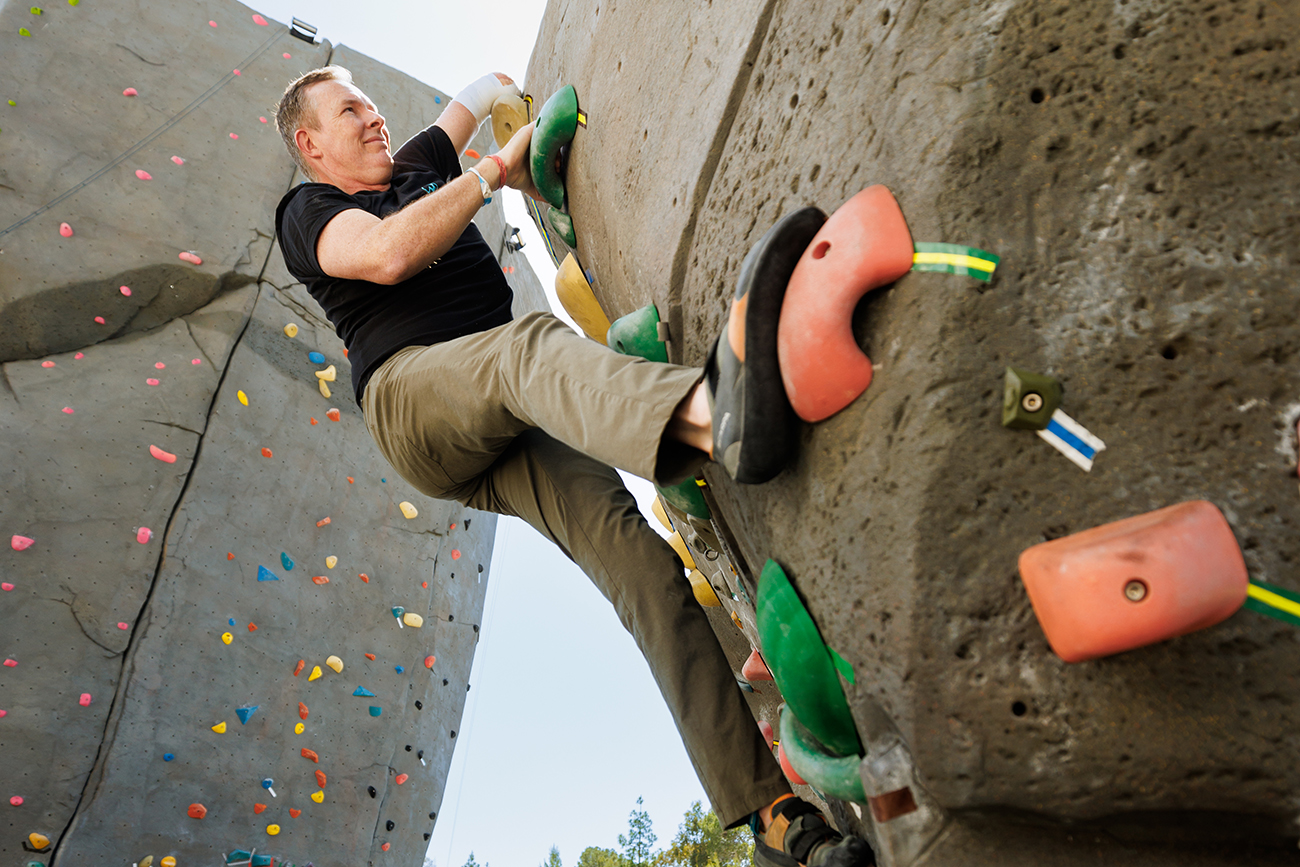An Uphill Climb
Witness mathematics professor Dylan Retsek’s life-changing journey to becoming an international competitive paraclimber at 50.

Dylan Retsek has always been a competitor. Born without a left hand, he grew up playing every sport he could — basketball, surfing, tennis, baseball, swimming and soccer.
Now, at the age of 50, the Cal Poly professor of mathematics has found a new competitive challenge. This spring he qualified to join the U.S. National Paraclimbing Team and spent the summer representing the United States at a series of Paraclimbing World Cup events in Salt Lake City; Innsbruck, Austria; and Arco, Italy.
“It’s never too late to find a new passion or excel at something,” said Retsek. “This is the start of an unlikely story, and I just feel like I’m trying to write that story.”
Retsek’s climbing journey began just a few years ago when he and a few fellow dads took their kids to try out The Pad, a San Luis Obispo climbing gym. Both kids and dads were hooked, and Retsek began to incorporate climbing into his regular sporting routine.
Despite falling in love with climbing, Retsek had never considered competing until last year when he learned that paraclimbing star Mo Beck would be speaking at the Cal Poly Performing Arts Center. He reached out to Beck on Instagram, and she suggested they meet up for a quick climb. Meeting up at The Pad, Retsek finished a moderately challenging route and realized that Beck was staring at him, incredulous.
“She goes, ‘How are you not part of this community? You’re really good — you should do this competitively!’” he said. “I thought she was just being polite, but she was really persistent.”
I was just a recreational climber for seven years, and now here we are. I have a USA jersey on and I’m going to Austria.
At Beck’s suggestion, Retsek stepped up his climbing regimen and registered for the 2024 USA Climbing Paraclimbing National Championships in Washington, D.C. The event served as a qualifier for the U.S. national team, and to his surprise, Retsek made the team.
“It happened that fast,” said Retsek. “I was just a recreational climber for seven years, and now here we are. I have a USA jersey on and I’m going to Austria.”
In international competition, climbers compete in groups with others who share a similar disability. Climbers earn points based on how high they can reach on specially designed routes that become increasingly difficult as they ascend.
In his first few international events, Retsek has discovered a competitive climbing community that feels both welcoming and very familiar.
“It reminds me of my competitive youth, playing other sports, trying to play at a high level, and having that energy and adrenaline and sportsmanship,” he says. “But there’s a different vibe about it in terms of camaraderie. They’re trying to push each other and also to push the sport. It’s not confrontational in any way — there’s a lot of encouragement, and they know I’m the new guy on the block.”
At Innsbruck, Retsek finished last in his group, but he came away from the competition gratified that he had done his best.
“My competitors are young and shredded and, despite being half my age, have twice my experience or more. It’s an uphill climb,” he said. “This is my first year of trying this. I’ve been telling myself, ‘You’re just trying to gather experience.’”
As he approaches an academic sabbatical, he’s looking forward to devoting more time to training in preparation for upcoming competitions.
“I think I can be much better than I currently am, and after training hard for a year, I’ve already seen a ton of gains,” he said. “If I’m lucky enough to participate in a few more World Cups, I think I’ll be a better climber just based on having those experiences. I really felt like there was some progress and I’m just amped to keep training.”


